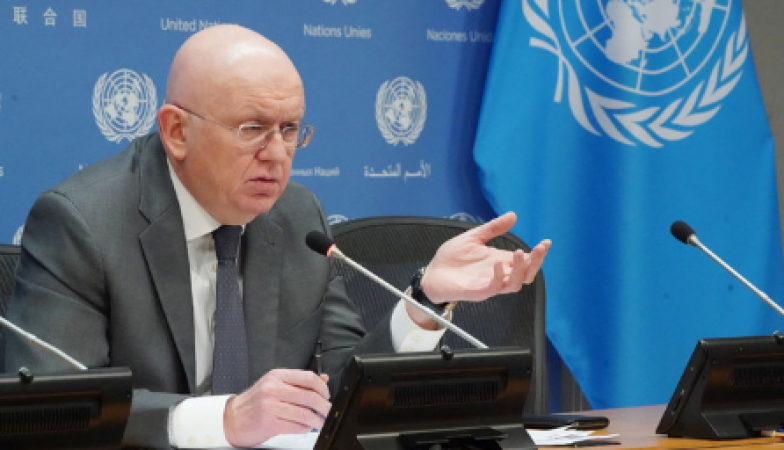
UNO: On Monday, Russia's UN ambassador rejected the US and EU's criticisms of its month-long Security Council presidency as an April Fool's joke and announced a meeting to be presided over by Foreign Minister Sergey Lavrov to discuss upholding the UN Charter, which Moscow is widely believed to have violated by invading Ukraine.
The US expects the Russians to be professional, but earlier on Monday, US Ambassador Linda Thomas-Greenfield told reporters that the Russians would use their position as host "to spread misinformation and advance their own agenda with regard to Ukraine, and we will stand ready to call them out at every single moment that they attempt to do so."
She and Josep Borrell, the head of foreign policy for the European Union, both referred to Russia's assumption of the council presidency as an April Fool's joke.
Also Read: Erdogan advises the US ambassador to respect his position
According to Security Council regulations, the 15 members alternate receiving the monthly presidency in alphabetical order. The rules of the council, which is in charge of upholding global peace and security, won't change, the Russian Ambassador Vassily Nebenzia assured reporters, adding that his country will act as "an honest broker."
It is up to the council president to set the agenda for important sessions, which are frequently presided over by foreign ministers and occasionally by presidents. A session on "effective multilateralism through the defence of the principles of the UN Charter" will be led by Lavrov on April 24.
Additionally, Lavrov will preside over monthly meetings on the Middle East, Syria, and other international hotspots like Mali, Libya, Yemen, Haiti, the region of Africa's Great Lakes, and Colombia.
Nebenzia referred to it as "a Western narrative" and emphasised that "we think just the opposite" in response to the US ambassador's concern that Russia would spread false information about Ukraine.
Also Read: Trump investigation looking into potential interference evidence
In response to what Moscow claims is misinformation being spread by Western officials and the media about the Ukrainian children taken to Russia, he stated that Russia plans to hold an informal council meeting on the subject on Wednesday. The purpose of the meeting, according to him, is "to dispel this narrative" that they were kidnapped.
The International Criminal Court issued arrest warrants for Russian President Vladimir Putin and his nation's commissioner for children's rights last month, accusing them of war crimes for the "illegal deportation" of Ukrainian children to Russia. This brought attention to the issue. The warrants were deemed "outrageous" and "legally void" by Moscow.
The open attempt to place Ukrainian children up for adoption in Russia was found to be well underway, according to an Associated Press investigation that was first published in October. Nearly 8,000 children were allegedly sent from Ukraine to Russia at the time, though the exact number was difficult to determine.
James Kariuki, the deputy UN ambassador of the United Kingdom, asserted that Russia was ineligible to discuss international law or UN principles.
"It is waging a war of aggression against Ukraine, violating the most fundamental tenet of the UN Charter—you don't redraw borders by force—and its president has been charged by the ICC with the systematic kidnapping of Ukrainian children," he said.
"The UK will continue to use our position on the council to oppose their illegal war, expose their misinformation, and defend the council's crucial work addressing other threats to global peace and security, including those in Africa and the Middle East."
Ukraine and the Baltic countries both expressed their strong disapproval of Russia's assumption of the council presidency. Volodymyr Zelensky, the president of Ukraine, criticised the "bankruptcy" of the Security Council and reiterated his call for reforms to the UN body and other international organisations.
The UN ambassador for Estonia, Rein Tammsaar, called the Russian presidency "shameful, humiliating, and dangerous" for the credibility of the council while also speaking on behalf of Latvia and Lithuania.
Nebenzia was questioned about whether Russia would exercise its right to abstain from voting when Ukraine was under discussion in accordance with Security Council protocol.
"No," he responded, indicating that in addition to Ukraine's allies, the US, Britain, and France would also have to leave.
Also Read: General strikes in Arab communities in Israel are caused by the murder of a doctor at Al-Aqsa
The Russian ambassador recalled that the US and UK held the council presidency consecutively in September and October 2003, following the US-led invasion of Iraq in March 2003.
Nobody questioned their eligibility to serve as president, Nebenzia claimed. And nobody raised the possibility that they stop talking about one of the topics that was perhaps the hottest at the time.